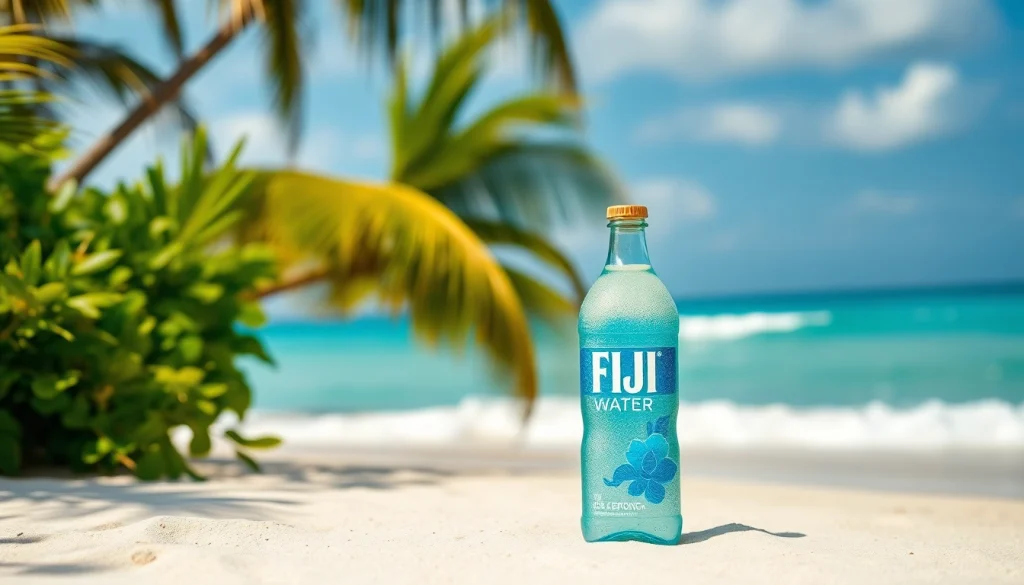Understanding Fiji Water’s Unique Source
Fiji Water, celebrated for its purity and mineral content, originates from an untouched source found within the remote islands of Fiji. Nestled in the lush and volcanic landscape of Viti Levu, this fiji water stands out not just for its composition, but also for its rich history and sustainable practices. Understanding the source of Fiji Water is critical in appreciating why it’s often deemed “Earth’s Finest Water.” This section delves into the intricacies of its source, how it is filtered, and the geographic factors influencing its taste.
The Artesian Aquifer Explained
The water used in Fiji Water is sourced from an artesian aquifer located in the Yaqara Valley. This aquifer, a reliable underground water source, is fed by rainfall that filters through layers of volcanic rock over many years. The unique geological environment contributes to the purity of the water and creates an ideal setting for bottling. Water from the aquifer is naturally pressurized, which allows it to rise to the surface without the need for pumps, minimizing its exposure to potential contaminants.
Mineral Composition of Fiji Water
Fiji Water boasts a distinctive mineral profile, characterized by a range of beneficial minerals, including calcium, magnesium, and silica. The mineral content is not only critical for taste but also for overall health and hydration. Here’s a breakdown of its mineral composition:
- Calcium (Ca): 18 mg/L
- Magnesium (Mg): 15 mg/L
- Silica (SiO2): 93 mg/L
- Fluoride (F): 0.26 mg/L
- Total Dissolved Solids (TDS): 222 mg/L
This mineral composition influences not only the taste of the water but also contributes to its health benefits, potentially aiding in hydration and promoting bone and joint health.
Geographic Impact on Taste
The unique taste of Fiji Water is significantly influenced by the geographical location of its source. The water flows through volcanic rock, which imparts specific mineral characteristics that differentiate it from other bottled waters. The artesian aquifer’s isolation from pollution also plays a key role, ensuring that every drop retains its natural taste, free from contaminants commonly found in urban water sources.
The Benefits of Drinking Fiji Water
In addition to its unique source and taste, Fiji Water offers several benefits that make it a favored choice among health-conscious consumers. The hydration, mineral content, and alkaline properties contribute to numerous health advantages.
Hydration and Mineral Advantages
The mineral composition of Fiji Water appears to enhance its hydrating properties. Minerals like magnesium and calcium play essential roles in maintaining hydration levels, supporting muscle function, and facilitating other bodily processes. Moreover, the absence of additives and impurities makes it an excellent choice for replenishing fluids after physical activities.
pH Level and Health Implications
Fiji Water has a naturally alkaline pH level of around 7.7. This slight alkalinity may help neutralize acidity in the body, providing potential health benefits such as better digestion and reduced acid reflux. However, while some studies suggest that alkaline water can aid in hydration, more research is needed to fully understand its long-term health effects.
Environmental Considerations
Fiji Water places a significant emphasis on sustainability. The company implements eco-friendly practices, from sourcing to packaging. For instance, Fiji Water is bottled in traceable production processes, ensuring a minimal ecological footprint. Efforts to give back to the local community and environment, such as reforestation programs, illustrate a commitment to preserving Fiji’s natural resources, enhancing the brand’s appeal among eco-conscious consumers.
Fiji Water’s Brand Story
Fiji Water has not only positioned itself as a premium bottled water brand but has also etched a compelling narrative that resonates with its customers. Understanding the history and principles behind the brand helps consumers appreciate the product beyond its hydration benefits.
History and Origins of Fiji Water
Founded in 1996, Fiji Water’s inception was rooted in the state-of-the-art vision of creating pure, natural water sourced from the heart of Fiji. The company quickly became one of the top imported bottled waters in the United States, largely due to its extraordinary quality and the story behind its origins. Each bottle represents the rich heritage and pristine environment of the Fijian islands.
The Vision of Sustainability
Sustainability is at the crux of Fiji Water’s mission. The organization invests in programs designed to restore and preserve the natural beauty of Fiji. This includes initiatives targeting water conservation, waste reduction, and community involvement, thereby fostering a vibrant ecosystem and supporting local communities, which enhances the brand’s ethical narrative.
Brand Positioning in the Market
Fiji Water is often marketed as a luxury product, standing out in a crowded bottled water market. Its distinctive square bottle, coupled with striking branding featuring palm trees and the idyllic landscapes of Fiji, evokes imagery of luxury and natural purity. Consumers are often drawn to its premium positioning, which is not only about hydration but also about lifestyle and identity.
Buying Guide: Choosing the Right Fiji Water Product
When it comes to enjoying Fiji Water, consumers are presented with a variety of options to suit different needs and preferences. Understanding the variety of products available can help ensure an optimal experience.
Different Bottle Sizes and Uses
Fiji Water is available in several bottle sizes, each catering to specific occasions:
- 500mL: Ideal for on-the-go hydration, this convenient size is perfect for workouts or carrying in a bag.
- 1.5L: Perfect for sharing or keeping at home, this size is suitable for family gatherings or parties.
- Case Packs: For those who regularly consume Fiji Water, purchasing in bulk can be both economical and convenient.
Where to Purchase Fiji Water
Fiji Water can be found in most supermarkets, convenience stores, and online retailers. Popular platforms include Amazon and specialty grocery stores, which often carry a range of sizes. Checking the availability at local retailers can also yield competitive pricing and potential discounts.
Comparative Pricing Insights
Prices for Fiji Water can vary significantly based on location and vendor. Typically, a 500mL bottle can cost anywhere from $2.00 to $3.50, while larger sizes such as the 1.5L can range from $4.00 to $7.00. Exploring bulk buying options might offer significant savings for those who incorporate Fiji Water regularly into their hydration routine.
FAQs about Fiji Water
Is Fiji Water Healthier Than Other Bottled Waters?
Many consumers often wonder if Fiji Water stands above other bottled waters in terms of health benefits. With its high mineral content and unique sourcing process, many believe it offers superior hydration and taste. However, each bottled water brand has its benefits, and personal preferences play a significant role in choosing the best option.
What to Know About Fiji Water Recalls
Like any consumable product, Fiji Water has faced occasional recalls. It’s important for consumers to stay informed about potential recalls or quality issues. Staying updated with news from reliable sources or the manufacturer’s website can provide insights into product safety and quality.
How to Incorporate Fiji Water into Your Daily Routine
Incorporating Fiji Water into your daily hydration routine can be simple and enjoyable. Consider setting personal hydration goals, using Fiji Water during workouts, or keeping a bottle on your desk for daily sips. You may also consider using it as a complement to meals to enhance their flavors.


